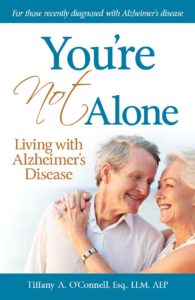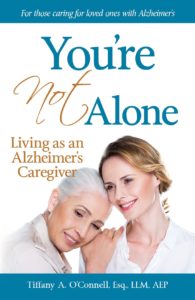March 2021
 |
 |
|
|
|
|
|
Serving as a caregiver may require you to oversee your loved one’s legal affairs. A recent article on AARP’s website addressed this issue and included a legal checklist for Caregivers. Here are the highlights.
|
|
|
Obtain Essential Legal Documents
Your loved one should have the following key legal documents: a Will, a Power of Attorney, and Advance Directives. We will discuss these documents in greater detail later. For now, it is important to note that these documents should be created, signed, and witnessed while your loved one is still capable of making legal decisions on his or her own.
Get the Whole Family Involved
It is important to have everyone in the family participate in caregiving decisions whenever possible. You may even want to put into writing “who is responsible for what.” While this is not a legal document, it can help avoid disagreements in the future.
Organize Your Loved One’s Important Papers
In addition to the essential legal documents mentioned above, you’ll want to find and organize a number of other documents, including:
- Birth and Marriage Certificates
- Divorce Decree
- Citizenship Papers
- Death Certificate of a Spouse or Parent
- Deeds to Cemetery Plots
- Military Discharge Papers
- Insurance Policies
- Pension Benefits
|
|
|
Investigate Opportunities for Financial Assistance
There are a number of programs and services available to elders and/or individuals with disabilities. These include Social Security Disability Insurance (SSDI), Supplemental Security Income (SSI), veterans benefits, the Supplemental Nutrition Assistance Program, Medicare, and Medicaid. You can use online tools like the AARP Foundation’s Local Assistance Directory and the National Council on Aging’s Benefits Checkup to determine local, state, and federal programs for which your loved one might be eligible.
You should also examine your loved one’s retirement and insurance plans to see if any of them cover in-home care, skilled nursing care, mental health services, physical therapy, and other forms of short-term assistance. Your loved one’s life insurance policy might even provide accelerated death payments to help pay for long-term care.
|
|
|
Also, if you must take a leave of absence from your job to care for a loved one, you may be eligible for up to 12 weeks of unpaid leave under the federal Family and Medical Leave Act. In addition, some employers offer paid family leave, and five states (New York, New Jersey, Rhode Island, Washington, and California) plus the District of Columbia have laws mandating paid leave for caregiving. Several other states are set to implement such laws by 2023.
Explore Tax Breaks and Life Insurance Deals
Your loved one may be able to receive federal tax deductions for health care expenses such as a wheelchair or hospital bed, remodeling the home to make it more accessible, and hiring a short-term or part-time home health aide to provide respite for the primary caregiver. Be sure to save receipts for all medical expenses.
|
|
|
|
|
|
|
A Last Will and Testament is an essential legal document that allows you to accomplish a number of important goals. You can name your beneficiaries and specify the assets you want them to receive; name a guardian for your minor children; and choose the person you want to settle your estate (known as the Executor).
In short, a Will helps ensure your wishes are carried out after you pass away. However, it does not ensure that your wishes regarding your finances and medical care will be followed if you become incapacitated. For that you will need other essential documents. |
|
|
|
Power of Attorney for Health Care
A Power of Attorney for Health Care, also known as a Health Care Proxy, allows you to name a person you trust to make health care decisions on your behalf if you are no longer able to make them on your own. Medical decisions covered by your Power of Attorney for Health Care can include choice of doctors and other health care providers; types of treatments; long-term care facilities; end-of-life decisions, such as the use of feeding tubes; and do not resuscitate orders.
Power of Attorney for Finances
Similar in concept to the Power of Attorney for Health Care, a Power of Attorney for Finances allows you to designate another person to make decisions about your finances, such as income, assets, and investments, when you can longer make them yourself.
By choosing your decision-makers in advance through powers of attorney, you and your loved ones can avoid the expense, stress, delays, and potential for family infighting associated with a court-ordered guardianship proceeding.
Living Will
A Living Will allows you to express your wishes regarding what medical treatments you want, or do not want, in an end of life situation. A Living Will differs from a Power of Attorney for Health Care in that it details your specific wishes, whereas a Power of Attorney for Health Care allows someone else to make health care decisions for you.
Another benefit of a Living Will is that it spares your loved ones from having to make difficult decisions about your care without knowing what you would have wanted.
HIPAA Release
A HIPPA Release lets you choose who can receive information about your medical condition. Hospitals and medical providers can be prosecuted for violating the Health Insurance Portability and Accountability Act (HIPAA) if they reveal your medical information to people not named in your HIPPA Release.
To ensure your wishes are carried out while you are alive and after you pass away, your estate plan should include all of the legal documents mentioned above.
Of course, estate planning can help you accomplish many other goals as well. For example, with a Revocable Living Trust your estate won’t have to go through probate. This will expedite the distribution of estate assets to loved ones and keep your financial information private. A Revocable Living Trust also allows you to stipulate when and under what conditions your heirs will receive their assets, which is useful if you think your children are not yet mature enough to handle an inheritance. Other tools, such as an Irrevocable Trust, can protect your assets against threats like long-term care costs, divorce, creditors, lawsuits, and more.
We invite you to contact us at your earliest convenience to discuss your unique planning needs and goals.
|
|
|
Upcoming Events |
 |
How to Plan for the Second Half of Life
Friday, April 9 12:00 PM - 1:00 PM
Wills & Trusts 101
Wednesday, April 14 5:00 PM - 6:00 PM
Estate Planning for Parents with Minor Kids
Friday, May 7 12:00 PM - 1:00 PM
How to Plan for the Second Half of Life
Wednesday, May 19 5:00 PM - 6:00 PM
Register today to reserve your spot for this webinar.
Additionally, registration for this event is critical so that we can contact you if it is prudent to cancel this session or if we need to change how we are able to offer this to you.
|
| Register Now |
|
|
A Personal Note From Tiffany |
 |
|
|
Spring is in the air! Along with warmer temperatures comes new life (Check out the pic of the crocus I planted in the Fall. It’s starting to pop out of the ground!).
New life even happens here at the firm in the form of new team members. As we say goodbye in April to our rock star law intern, Camille (who is graduating!), we get ready to welcome new law interns to the team. We strongly believe in helping develop future attorneys and we are fortunate to have wonderful law school students who do internships with us. In April, we will be welcoming our new group of law interns and we look forward to introducing them to you.
|
|
|
|
In the meantime, get outside when you can. As always, thank you for taking the time to read and reflect.
Sending you all a remote hug,
|
|
|
Camille Stecker – We have been very fortunate to have Camille as a legal intern for the past year. She has the nerve to be graduating from law school next month and will then be focusing her time this summer studying for the bar exam. We are sad to see Camille leave us in a few weeks, but she will always be part of our OCL family. Camille, thank you!
|
|
|
Sophia Bucal – Sophia recently became an aunt! She’s very excited to meet her niece sometime soon.
|
|
|
Order Our Complimentary Books
|
|
|
 |
|
You're Not Alone — Living with Alzheimer's Disease
Order Here |
|
 |
|
You're Not Alone — Living as an Alzheimer's Caregiver
Order Here |
|
|
Or Call Us at 508-202-1818
|
|
|
 |
|
|